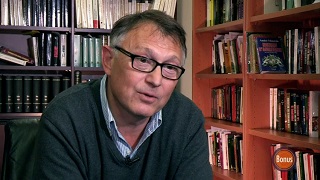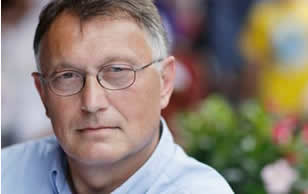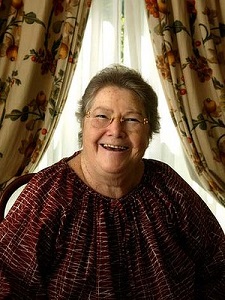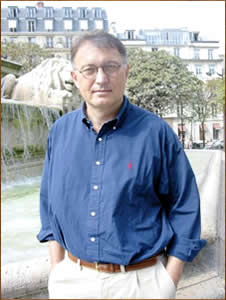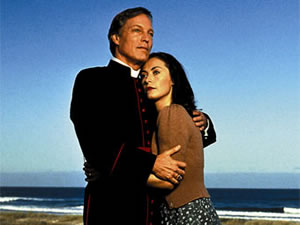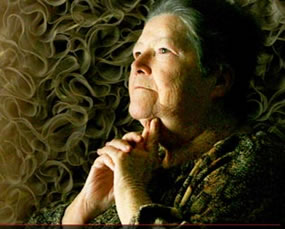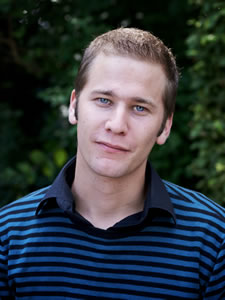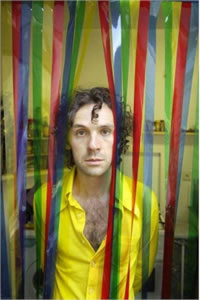De Franse schrijver en journalist Patrick Besson werd geboren op 1 juni 1956 in Montreuil. Zie ook alle tags voor Patrick Besson op dit blog.
Uit: Tout le pouvoir aux soviets
« Ma dernière nuit à Moscou, capitale de la Russie lubrique et poétique. La ville où les piétons sont dans les escaliers des passages souterrains et les automobilistes au-dessus d’eux dans les embouteillages. Avenues larges et longues comme des pistes d’atterrissage. Retrouver la chambre 5515 du Métropole ou aller boire un verre ailleurs ? J’aime sortir, mais aussi rentrer. Il y a ce club libertin sur Tverskaïa, où mes clients étaient sans moi hier soir, après la signature de notre contrat. Jamais dans un club libertin avec des clients, même après la signature d’un contrat : photos, puis photos sur les réseaux sociaux. Je travaille dans l’argent, et l’argent, c’est la prudence.
Va pour le club. Dans le goulet d’étranglement de l’entrée, un distributeur de billets qui annonce la couleur : celle de l’argent. L’air mélancolique des deux gros videurs. À droite le bar, à gauche des seins. Il y a aussi des seins au bar. Je compte – c’est mon métier – quatorze filles nues ou en sous-vêtements pornographiques. Peaux d’enfant, visages d’anges. Elles me dansent dessus à tour de rôle. Obligé d’en choisir une pour échapper aux autres. Je prends la plus habillée, ça doit être la moins timide. Et j’aurai une occupation : la déshabiller. C’est une Kazakh ne parlant ni anglais ni français, dans une courte robe qui, dans la pénombre, semble bleue. On discute du prix à l’aide de nos doigts. Je l’emmène dans une chambre aux murs noirs et sans fenêtres qui se loue à la demi-heure. Le cachot du plaisir. Le point faible de la prostitution moderne : l’immobilier. Les bordels de nos grands-pères avaient des fenêtres. Et parfois des balcons.
Au cours des trente minutes suivantes, m’amuserai à soulever puis à rabaisser la robe de la Kazakh sur ses fesses rondes et fraîches. Je veux bien payer une femme à condition de ne pas coucher avec elle. La fille m’interroge, par petits gestes inquiets, sur ce que je veux. Étonnée d’échapper à l’habituel viol. Je ne lui ai pas dit que je parle russe. Tout le monde n’a pas eu la chance d’avoir un papa communiste. S’il s’était douté que la langue de Lénine me servirait autant dans la finance, mon père m’aurait obligé à en apprendre une autre.
C’était juste après la mort de maman qui m’a toujours parlé français par haine de sa terre natale soviétique.”
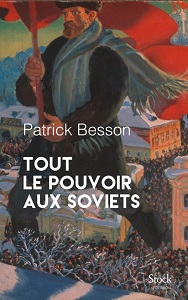
Patrick Besson (Montreuil, 1 juni 1956)
Cover
De Engelse dichter en schrijver John Edward Masefield werd geboren op 1 juni 1878 in Ledbury, in Herefordshire. Zie ook alle tags voor John Masefield op dit blog.
The Racer
I saw the racer coming to the jump,
Staring with fiery eyeballs as he rusht,
I heard the blood within his body thump,
I saw him launch, I heard the toppings crusht.
And as he landed I beheld his soul
Kindle, because, in front, he saw the Straight
With all its thousands roaring at the goal,
He laughed, he took the moment for his mate.
Would that the passionate moods on which we ride
Might kindle thus to oneness with the will;
Would we might see the end to which we stride,
And feel, not strain in struggle, only thrill,
And laugh like him and know in all our nerves
Beauty, the spirit, scattering dust and turves.
I never see the red rose crown the year
I never see the red rose crown the year,
Nor feel the young grass underneath my tread,
Without the thought “This living beauty here
Is earth’s remembrance of a beauty dead.
Surely where all this glory is displayed
Love has been quick, like fire, to high ends,
Here, in this grass, an altar has been made
For some white joy, some sacrifice of friends;
Here, where I stand, some leap of human brains
Has touched immortal things and left its trace,
The earth is happy here, the gleam remains;
Beauty is here, the spirit of the place,
I touch the faith which nothing can destroy,
The earth, the living church of ancient joy.”
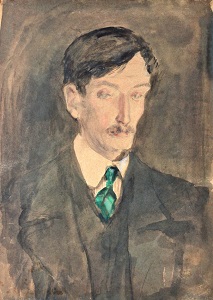
John Edward Masefield (1 juni 1878 – 12 mei 1967)
Portret door Jack B. Yeats, 1905
De Oostenrijkse schrijver Ferdinand Raimund werd geboren op 1 juni 1790 in Wenen. Zie ook alle tags voor Ferdinand Raimund op dit blog.
Uit: Der Diamant des Geisterkönigs
„FEUERGEIST (ganz rot gekleidet, rotes Gesicht und rote Hände; er hat die ganze Szene behorcht). Potz Pech und Schwefel, das ist zuviel! Ich bin Feuergeist, Oberfeuerwerker und Kanonier des Zauberkönigs! Wer kann sagen, daß seit drei Jahren eine menschliche Seele in seinen Palast gekommen ist? Bin ich nicht auf seine Kosten nach Neapel gereist, um den Vesuv aufzunehmen und einen ähnlichen über seinen Palast zu bauen? Ist das nicht geschehen? Blausäure und Vitriolöl!
FEE APRIKOSA. Und warum ist es geschehen? Damit wir ihn nicht sooft belästigen und mit unserm Wolkenwagen jetzt durch den Krater fahren müssen, wie die Hexen durch den Rauchfang.
FEUERGEIST. Nein! Potz Pech und Schwefel! Damit er von der Menschheit, die sich durch verschiedene magische Künste in sein Reich filoutiert hatte, um ihn mit Betteleien zu belästigen, Ruhe bekomme.
ZWEITER ZAUBERER. Ja, ja, so ist der Kaffee.
ERSTER ZAUBERER. Das müssen Sie Narren weismachen.
FEUERGEIST. Aber, ins Geiers Namen, das tue ich ja; und wer’s nicht glauben will, den sollen alle kongreveschen Raketen –
ZWEITER ZAUBERER (gleich einfallend). Nun, nun, mein Herr Feuergeist und Oberkanonier, moderieren Sie sich nur! Sie zünden ja sonst den Palast an mit Ihren Raketen.
ALLE Werft ihn hinaus! Hinaus mit ihm!
FEUERGEIST. Was? Einen Feuergeist hinauswerfen?
ZWEITER ZAUBERER. Da haben wir schon andere hinausgeworfen.
FEUERGEIST. Beim Brand von Moskau, das ist zuviel! (Mit geballter Faust) Wer mir in die Nähe kommt, dem werf’ ich eine Leuchtkugel an den Kopf, daß ihm das bengalische Feuer aus den Augen spritzen soll.“
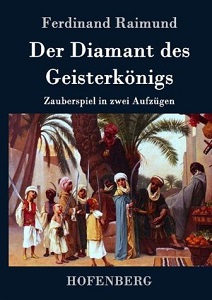
Ferdinand Raimund (1 juni 1790 – 5 september 1836)
Cover
De Duitse schrijver, essayist, journalist, biograaf en uitgever Peter de Mendelssohn werd op 1 juni 1908 in München geboren. Zie ook alle tags voor Peter de Mendelssohn op dit blog.
Uit: Der Zauberer
“Der Krieg war rundherum und ganz und gar verloren. Das große Rückzugsgefecht des Unpolitischen, mit Bravour und im nahezu sicheren Wissen um seinen schlechten Ausgang geführt, war zu Ende. Die heile Welt der machtgeschützten Innerlichkeit, das festgefügte wilhelminische Obrigkeits-Deutschland, in welchem der Künstler Thomas Mann sich an seinem legitimen Platz gewußt hatte, zerbarst Stück für Stück vor seinen Augen. Die »Katastrophe und Weltniederlage dieser Geistesrichtung und Sympathie« des konservativen Deutsch-land, so schrieb er am 5. Oktober 1918, sei da, und fügte hinzu: »Es ist auch die meine. « Freilich, »so lange noch ein Kaiser an der Spitze steht«, meinte er zwölf Tage später, »ist das roman-tische, das mittelalterliche Deutschland nicht tot«. Aber er wußte und notierte für sich: »Der Kaiser wird abdanken.« Hellsichtig war er nicht; aber er war auch nicht vor Gram und Enttäuschung blind. Am z1. Oktober notierte er: »Wilhelm II. als Privatmann in Civil an einem Schweizer See spazieren ge-hend ist auch eine wunderliche Vorstellung«. Die ganze Welt war ihm zu einer wunderlichen Vorstellung geworden. Im Sturm der politischen Ereignisse des Winters 1918-1919, in dem aus den Trümmern des Kaiserreichs notge-drungen und widerwillig die Republik hervorkam, und noch lange danach, war er, nicht anders als viele Deutsche, wohl gar die meisten, eine schwankende Gestalt. Er mußte seinen Standort von Woche zu Woche, ja von einem Tag zum näch-sten neu zu bestimmen suchen. »Man sieht heute keine drei Schritte weit, wer weiß denn, was in 8 Monaten sein wird …«, schrieb er. Indessen erwies sich ihm allmählich, daß die zerbro chene, unheile Welt, in der er sich fand, noch genug unver-sehrte Elemente der heilen enthielt, damit er sie, zumindest für sich selbst und vielleicht auch für andere, wieder zusammen-fügen und womöglich in nicht allzu veränderter Gestalt wie-der heilen konnte. In einer Trümmerwelt konnte und wollte er weder leben noch schaffen. Seine ganze zweite Lebenshälfte ist ein einziges, viele Phasen der Hoffnung und Enttäuschung durchlaufendes verbissenes Streben, für sich und sein Werk die Ordnung einer heilen Welt wiederzugewinnen, in Deutsch-land, in der Schweiz, in Amerika und endlich, an seinem Lebensabend, abermals in der Schweiz. Wenn diese Lebenshälfte überhaupt auf eine Kurzformel zu bringen ist, dann wäre es am ehesten noch diese.“
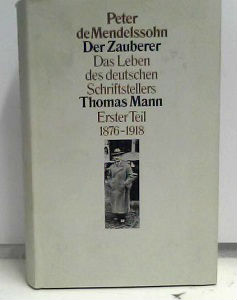
Peter de Mendelssohn (1 juni 1908 – 10 augustus 1982)
Cover
De Duitse schrijfster Petra Morsbach werd geboren op 1 juni 1956 in Zürich. Zie ook alle tags voor Petra Morsbach op dit blog.
Uit: Dichterliebe
“Eine Frau kommt über den Rasen auf mich zu und fragt: »Ist das hier das Künstlerhaus?. Ich muß in der Hitze eingenickt sein auf meinem Plastestuhl, das Hemd klebt mir am Rücken, Schweiß rinnt in die Augen. Vor dem weißen Rock die dunk-len Schlieren eines Traums. Alptraum, was sonst … Ich kam zu spät zur Lesung, suchte vergeblich den Ort, landete in der fal-schen Stadt, rannte durch einen Bahnhof ohne Anzeigetafeln. Eine Durchsage meldete zwanzig Minuten Verspätung, aber von welchem Zug? Bahnbedienstete standen herum und er-klärten: -Das alles geht uns nichts mehr an.• Eine Schaffnerin rief: •Geschieht Ihnen recht!. Endlich fand ich die Bibliothek, Zuhörer waren auch da, aber es stellte sich heraus, ich war gar nicht eingeladen. Der weiße Rock jetzt vor mir. Eine blaue Bluse mit silbernen Blättchen auf der Brust — die Silhouette eines Einhorns. Wieso Einhorn? Frau mit Sonnenbrille, Typ Westschnepfe: So stelle ich mir eine Zahnarztgattin auf Kulturtourismus vor. »Ja«, seufze ich, •das ist das Künstlerhaus.• »Dann sind Sie sicher ein Künstler?. »Ja.« Was sonst? »Ich auchl« Sie strahlt mich an. Streckt mir die Hand entge-gen: »Sidonie Fellgiebel. Ich trete heute mein Stipendium an!. Eine Mitbewohnerin, o Gott. Ich stehe mühsam auf und reiche ihr die Hand. »Heinrich Steiger?. Den Namen hört sie sichtlich zum ersten Mal. Natürlich hört sie ihn zum ersten Mal. Deine Zeit ist vorbei, gewöhne dich daran. •Sonntags ist das Büro nicht besetzt•, bemerke ich lahm. »Ich weiß. Irene Ammann vom Appartement vier soll meinen Schlüssel haben. Aber vorn macht niemand auf. Das ist doch das Haupthaus? Wohnen Sie auch dort?. Nein, ich wohne nicht don, ich wohne hier im Schafstall, im sogenannten. Und was geht mich Irene Ammann an? Wahr-scheinlich ist sie drüben bei den Bildenden Künstlern und kocht. Warum kocht sie nicht mit mir? Seit Tagen habe ich sie nicht gesehen, immer hockt sie auf ihrer Bude, na, vielleicht ist sie krank. Bei schönem Wetter sitzt sie manchmal abends mit ei-nem Schreibblock auf dem Mäuerchen und notiert Einfälle für ihre Extremlyrik. Aber noch ist nicht Abend. •Was ist Extremlyrik?. Habe ich laut gesprochen? Auch das noch. »Vielleicht erklärt Ihnen besser Irene selbst … Entschuldigen Sie mich, ich bin … Hof der Bildenden Künstler ist das nächste große Haus, die Straße entlang links …« »Vielen Dank!« Die Schnepfe hüpft davon. Nicht mehr ganz jung, Mitte Dreißig vielleicht, etwas schwerer Hintern. Wirkt wie eine Anfängerin. Westanfängerin. Wehe, sie schenkt mir ihr Erstlingswerk. Zwei Stunden später taucht sie wieder auf und erkundigt sich, wo sie was zu essen bekäme.“
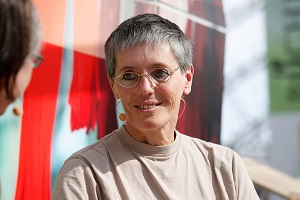
Petra Morsbach (Zürich, 1 juni 1956)
De Australische schrijfster Colleen McCullough werd geboren op 1 juni 1937 in Wellington. Zie ook alle tags voor Colleen McCullough op dit blog.
Uit: The Thorn Birds
“She was yanking inexpertly at a large knot when the dreadful thing happened. Off came the hair, all of it, dangling in a tousled clump from the teeth of the comb. Above Agnes’s smooth broad brow there was nothing; no head, no bald skull. Just an awful, yawning hole. Shivering in terror, Meggie leaned forward to peer inside the doll’s cranium. The inverted contours of cheeks and chin showed dimly, light glittered between the parted lips with their teeth a black, animal silhouette, and above all this were Agnes’s eyes, two horrible clicking balls speared by a wire rod that cruelly pierced her head.
Meggie’s scream was high and thin, unchildlike; she flung Agnes away and went on screaming, hands covering her face, shaking and shuddering. Then she felt Frank pull at her fingers and take her into his arms, pushing her face into the side of his neck. Wrapping her arms about him, she took comfort from him until his nearness calmed her enough to become aware of how nice he smelled, all horses and sweat and iron.
When she quietened, Frank made her tell him what was the matter; he picked up the doll and stared into its empty head in wonder, trying to remember if his infant universe had been so beset by strange terrors. But his unpleasant phantoms were of people and whispers and cold glances. Of his mother’s face pinched and shrinking, her hand trembling as it held his, the set of her shoulders.
What had Meggie seen, to make her take on so? He fancied she would not have been nearly so upset if poor Agnes had only bled when she lost her hair. Bleeding was a fact; someone in the Cleary family bled copiously at least once a week.
“Her eyes, her eyes!” Meggie whispered, refusing to look at the doll.
“She’s a bloody marvel, Meggie,” he murmured, his face nuzzling into her hair. How fine it was, how rich and full of color!
It took him half an hour of cajoling to make her look at Agnes, and half an hour more elapsed before he could persuade her to peer into the scalped hole. He showed her how the eyes worked, how very carefully they had been aligned to fit snugly yet swing easily opened or closed.”
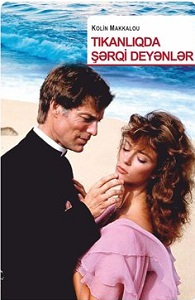
Colleen McCullough (1 juni 1937 – 29 januari 2015)
Cover Azerbeidzjaanse uitgave
De Argentijnse schrijver Macedonio Fernández werd geboren op 1 juni 1874 in Buenos Aires. Zie ook alle tags voor Macedonio Fernández op dit blog.
Uit: From The Museum of Eterna’s Novel (Vertaald door Margaret Schwartz)
“I leave only the title finished, since:
A prologue that starts right away is really sloppy: the perfume of its preceding is lost, just as I said that futurism can only be genuinely practiced by leaving it for later.
I will also have said, earlier, that this is one of the twenty-nine prologues of a novel that’s impossible to prologue, as a critic, who surely born in that tranquil country of “ask questions later,” has recently predicted; there’s another, more sympathetic, book, that is, one that’s more given to length and limited in prologues—which can still be remedied—which was going to be called “The Man Who Would Be President But Wasn’t.”
* * *
Or, an equivalent:
“Buenos Aires hysterical, torn between the hilarious faction and the faction of eternity, and saved by its splendid compatriot, who unifies humorism and passion.” But the title I’ve got left for “the novel permitted a beginning,” which although it begins late has no less of a beginning, and, if he reads it, the reader will wish it were all made of continuations, such as “Novel of Eterna, and of the Child of Melancholy, Sweetheart, of-a-love that was kept unknown.”
This last is the title a certain gentleman preferred; he began to read it and promised to come
back right away, to finish finding out how the novel is named.”
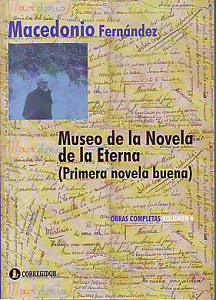
Macedonio Fernández (1 juni 1874 – 10 februari 1952)
Cover
De Canadese dichter en schrijver William Wilfred Campbell werd geboren rond 1 juni 1858 in Berlin, Ontario, tegenwoordig Kitchener. Zie ook alle tags voor William Campbell op dit blog.
An October Evening
The woods are haggard and lonely,
The skies are hooded for snow,
The moon is cold in Heaven,
And the grasses are sere below.
The bearded swamps are breathing
A mist from meres afar,
And grimly the Great Bear circles
Under the pale Pole Star.
There is never a voice in Heaven,
Nor ever a sound on earth,
Where the spectres of winter are rising
Over the night’s wan girth.
There is slumber and death in the silence,
There is hate in the winds so keen;
And the flash of the north’s great sword-blade
Circles its cruel sheen.
The world grows agèd and wintry,
Love’s face peakèd and white;
And death is kind to the tired ones
Who sleep in the north to-night.
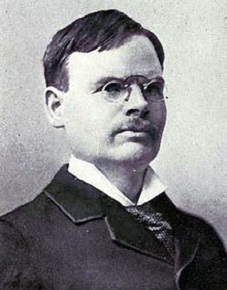
Wilfred Campbell (1 juni 1858 – 1 januari 1918)
Onafhankelijk van geboortedata
De Nederlandse dichteres Vicky Francken werd geboren op 18 maart 1989 in Boxmeer. Zie ook alle tags voor Vicky Francken op dit blog.
[de lucht vouwt zich een]
de lucht vouwt zich een
zakdoek om onze hoofden
zoals de wind zich bolt
in de holten van was, we
neuriën absurde melodietjes
zoals in oude films van kleine
meisjes rennen we rond met
emmertjes om de regen op te vangen
voordat we de jongste uit het
oog verliezen, zij met haar
mooiste kaplaarsjes de vijver
instapt en zich afvraagt hoeveel
belletjes ze maakt op het
wateroppervlak dat zich boven
haar hoofd als een deur sluit
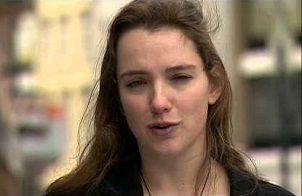
Vicky Francken (Boxmeer, 18 maart 1989)

